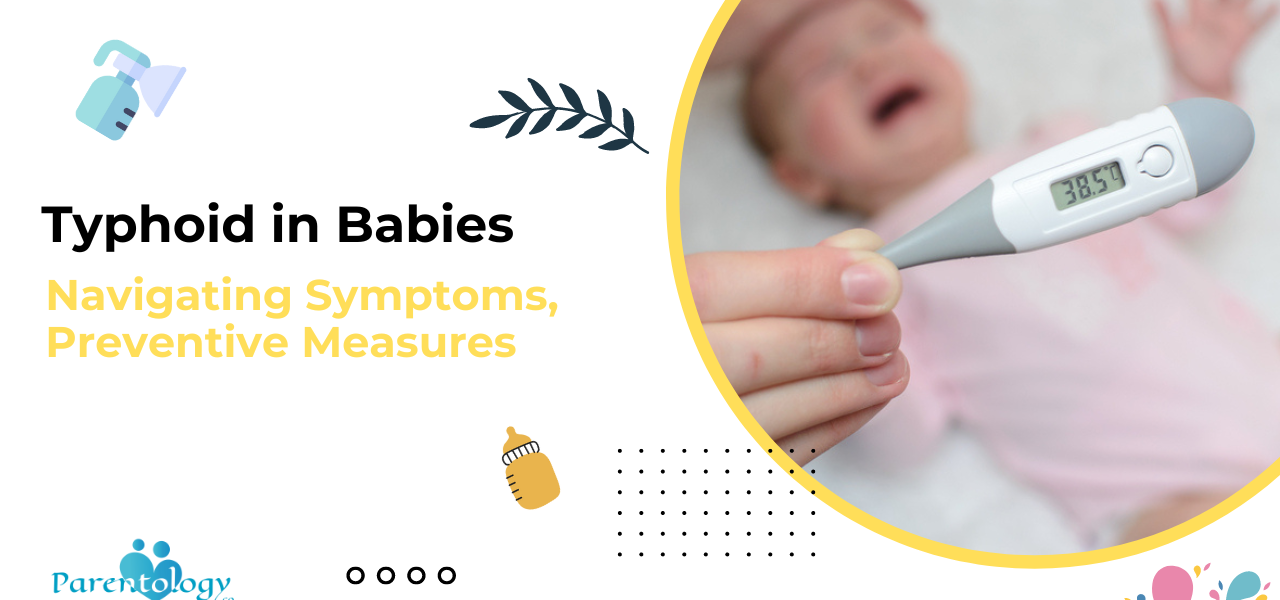Typhoid in Babies: Navigating Symptoms, Preventive Measures, and Empowered Parenting
Welcoming a new member into the family is a joyous occasion, but it also brings a set of responsibilities, including safeguarding your little one’s health. Typhoid, a bacterial infection caused by Salmonella Typhi, can affect people of all ages, including babies and toddlers. In this comprehensive guide, we delve into the Symptoms of Typhoid, causes, and treatment of typhoid in the youngest members of our families.
Symptoms of Typhoid in Babies: Unveiling the Signs
Identifying the Common Signs:
Symptoms of Typhoid in babies can be subtle, making it challenging for parents to recognize the infection. Look out for persistent fever, often accompanied by a slow heart rate and lethargy.
Changes in Bowel Habits:
Observe any alterations in your baby’s bowel habits. Typhoid can cause diarrhea or constipation, and stool may appear green due to bile involvement.
Abdominal Discomfort:
Babies with typhoid may experience abdominal discomfort, which can manifest as cramps or general uneasiness. Pay attention to your baby’s reactions during feeding or when the abdomen is touched.
Causes of Typhoid in Babies: Unraveling the Origins
Contaminated Food and Water:
The primary cause of typhoid in babies is the consumption of contaminated food or water. As their immune systems are still developing, babies are more susceptible to bacterial infections.
Carrier Transmission:
If a family member or caregiver is a carrier of the Salmonella Typhi bacteria, there’s a risk of transmission to the baby. Regular handwashing and hygiene practices are crucial.
Exposure to Infected Individuals:
Babies in daycare or those with older siblings may be exposed to infected individuals, increasing their likelihood of contracting the bacteria.
Treatment Options for Typhoid in Babies: Navigating the Road to Recovery
Antibiotic Therapy:
Doctors often prescribe antibiotics to treat typhoid in babies. It’s crucial to complete the entire course of antibiotics as prescribed to ensure the elimination of the bacteria.
Fluid Replacement:
Given that typhoid can lead to dehydration, fluid replacement is essential. Oral rehydration solutions or, in severe cases, intravenous fluids may be administered.
Dietary Considerations:
Maintaining a balanced diet is important for a baby with typhoid. Soft, easily digestible foods, such as porridge and soups, can help in the recovery process.
Preventing Typhoid in Babies: Proactive Measures for Parents
Immunization Consultation:
Discuss with your pediatrician the possibility of typhoid vaccination for your baby. While vaccines are not typically administered to very young infants, the discussion can help plan for future immunizations.
Hygiene Practices:
Ensure meticulous hygiene within the household. Regular handwashing, especially before handling the baby’s food or bottles, goes a long way in preventing the spread of infections.
Safe Water and Food Handling:
Be vigilant about the water and food your baby consumes. Boil or use purified water for drinking and cooking, and ensure that solid foods are prepared and stored with utmost cleanliness.
Recognizing Lesser-Known Symptoms of Typhoid: Unveiling Subtle Indicators
Irritability and Changes in Behavior:
Typhoid in babies can manifest as irritability and changes in behavior. If you notice unexplained shifts in mood or increased fussiness, consider consulting a healthcare professional.
Respiratory Symptoms:
In some cases, typhoid may present with respiratory symptoms such as a cough or congestion. While less common, these symptoms can be indicative of the infection.
Home Care Tips During Typhoid Recovery
Creating a Comfortable Environment:
Provide a comfortable and quiet space for your baby to rest. Minimize exposure to loud noises and create a soothing environment conducive to recovery.
Maintaining Regular Check-Ups:
Even after the acute phase of typhoid, schedule regular check-ups with your pediatrician to monitor your baby’s health and ensure a smooth recovery.
Dispelling Common Myths About Symptoms of Typhoid in Babies
Myth: Babies Cannot Get Typhoid
Fact: Babies can indeed contract typhoid, and their vulnerability stems from a developing immune system. Prompt diagnosis and treatment are crucial.
Myth: Typhoid is Always Accompanied by Diarrhea
Fact: While diarrhea is a common symptom, not all babies with typhoid experience it. Other Symptoms of Typhoid like constipation can also occur.
Seeking Professional Guidance: When to Consult a Pediatrician
Knowing when to seek medical help is crucial for the well-being of your baby. If you observe persistent Symptoms of Typhoid, such as prolonged fever, abdominal discomfort, or changes in behavior, consult a pediatrician promptly.
Navigating the Emotional Challenges: Support for Parents
Coping with Parental Stress:
A baby’s illness can be emotionally challenging for parents. It’s essential to acknowledge and address your own stress. Seek support from friends, family, or professionals if needed. Taking care of your mental well-being contributes to better caregiving.
Sibling Awareness and Involvement:
If you have other children, involve them in a manner suitable for their age. Explain the situation, reassure them, and encourage their participation in activities that support the sick sibling.
Community Resources and Support Groups:
Explore local or online communities where parents share their experiences dealing with illnesses in infants. These platforms offer valuable insights, emotional support, and a sense of community.
The Role of Nutrition in Typhoid Recovery
Balanced Diet Recommendations:
Ensure your baby receives a well-balanced diet during and after typhoid recovery. Include nutrient-rich foods like fruits, vegetables, and lean proteins to aid in overall health and strengthen the immune system.
Breastfeeding Considerations:
For breastfeeding mothers, continue nursing during the illness, if possible. Breast milk provides essential nutrients and antibodies that contribute to the baby’s recovery.
Transitioning to Solid Foods:
If your baby is already on solid foods, reintroduce them gradually. Opt for easily digestible options like rice, bananas, and plain yogurt to ease the digestive system back into normalcy.
Long-Term Health Monitoring: Ensuring Lasting Wellness
Regular Pediatric Check-ups:
Schedule periodic check-ups with your pediatrician even after the recovery phase. Monitoring your baby’s growth and development ensures any potential issues are addressed promptly.
Vaccination Schedule Adherence:
Adhere to the recommended vaccination schedule to enhance your baby’s immunity against preventable diseases. Consult with your pediatrician to stay updated on vaccinations suitable for your baby’s age.
Educational Resources for Continuous Learning
Parenting Workshops and Seminars:
Participate in parenting workshops or seminars that focus on infant health. Gaining knowledge from experts helps build a foundation for informed parenting decisions.
Online Courses on Child Health:
Explore online courses or resources that delve into child health topics. These courses can provide in-depth insights into caring for infants and toddlers, especially during illnesses.
Creating a Safe Home Environment: Preventive Measures
Hygienic Practices in the Household:
Maintaining a clean and hygienic environment is crucial for preventing the spread of infections. Regularly sanitize commonly touched surfaces, utensils, and toys to minimize the risk of bacterial contamination.
Personal Hygiene Habits:
Instill good personal hygiene habits in the household. Encourage handwashing before meals, after using the restroom, and after outdoor activities. Teach older siblings the importance of cleanliness to minimize the risk of cross-contamination.
Safe Food Handling Procedures:
Practice safe food handling and preparation. Ensure that fruits, vegetables, and meats are thoroughly washed before consumption. Cook food at appropriate temperatures to eliminate harmful bacteria.
Travel Precautions for Parents and Caregivers
Awareness of Water Sources:
When traveling with infants, be cautious about the water sources you use. Avoid giving babies water from unknown or unreliable sources, as contaminated water can be a potential carrier of infectious agents.
Consulting Healthcare Professionals:
Before traveling to regions where typhoid is prevalent, consult with healthcare professionals to understand preventive measures and vaccinations suitable for infants.
Maintaining Routine Vaccinations:
Ensure that your baby’s routine vaccinations are up-to-date, including those recommended for travel to specific regions. Vaccines play a crucial role in preventing various infectious diseases.
The Importance of Timely Medical Intervention
Early Detection through Regular Check-ups:
Regular pediatric check-ups are essential for early detection of any health concerns. By maintaining a consistent schedule of visits, potential issues can be identified and addressed promptly.
Immediate Medical Attention for Symptoms:
If you observe any concerning Symptoms of Typhoid in your baby, such as persistent fever, changes in behavior, or gastrointestinal issues, seek immediate medical attention. Early intervention contributes significantly to a positive outcome.
Community Engagement for Parental Support
Parenting Networks and Forums:
Engage with parenting networks and forums both online and in your local community. Sharing experiences, seeking advice, and offering support to other parents create a strong sense of community.
Building a Support System:
Establish a support system of friends, family, and fellow parents who can lend a helping hand or provide emotional support during challenging times.
FAQs About Symptoms of Typhoid in Babies
Q1: What age group is most susceptible to typhoid in babies?
A1: Babies and toddlers are particularly susceptible to typhoid due to their developing immune systems.
Q2: How is typhoid diagnosed in babies?
A2: Diagnosis typically involves blood and stool tests to detect the presence of the Salmonella Typhi bacteria.
Q3: Are there preventive measures for typhoid in babies?
A3: Ensuring proper hygiene, providing clean water, and practicing safe food handling can help prevent typhoid in babies.
Q4: Can breastfeeding protect babies from typhoid?
A4: While breastfeeding provides essential antibodies, it may not offer complete protection against typhoid.
Q5: Are there long-term complications of typhoid in babies?
A5: With prompt and effective treatment, most babies recover fully without long-term complications.
Q6: How can parents differentiate Symptoms of Typhoid from common illnesses in babies?
A6: Persistent fever, changes in bowel habits, and abdominal discomfort are key indicators that warrant medical attention.
Q7: Can typhoid vaccines be administered to babies?
A7: Consult with a pediatrician to discuss the appropriateness of typhoid vaccination based on the baby’s age and health status.
Q8: Is typhoid contagious among babies?
A8: Typhoid is primarily spread through contaminated food and water and is not typically highly contagious among babies.
Q9: What is the recovery period for babies with typhoid?
A9: The recovery period varies, but with timely and appropriate treatment, babies can recover within a few weeks.
Q10: How can parents support a baby’s recovery from typhoid at home?
A10: Follow medical advice, provide a nutritious diet, ensure proper hydration, and create a comfortable environment for rest and recovery.
Conclusion: Empowering Parents for a Healthy Start
Understanding the Symptoms of Typhoid, causes, and preventive measures in babies equips parents with the knowledge needed to navigate potential health challenges. By fostering a safe environment, prioritizing hygiene, and staying proactive in healthcare, parents play a pivotal role in ensuring their baby’s well-being. Parenthood is a continuous journey of learning and adapting, and with informed decisions, you pave the way for a healthy start and a resilient family.
For ongoing guidance on parenting and child health, explore the wealth of resources at Parentology.
Infographics-





